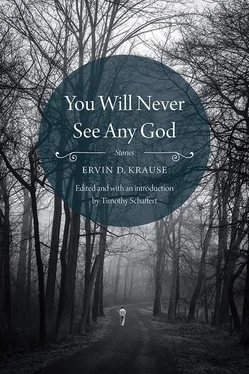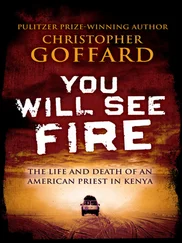“Well, I’d never make a witch,” the mother said, tee-heeing. “A pin cushion gets too dirty, so I use a box, and I just hate cats.”
A pause and old man Nystrom made profound nods of his head, his eyes squinting. “Oh, the Widow’s all right, I guess. Never bothered anybody.”
No, no, the boy thought, he knew that was not true. All had been planned, all had been figured in that terrible awareness of him , he himself, Herman, always that, she knowing of him even when singing, walking the lane to await the Liles, always she had known he was there, precisely where and how and when, through the cat awareness of him, surety of him , he knowing it now, at last with absolute certitude, nothing on her mind but him , she obsessed with him , sent the cat to watch him , lay in wait to catch him . He could feel it on him, like a massive weight, hot, overwhelming.
Old man Nystrom winked profoundly, waggled his big head. “Looka the boy taking it all in,” nodding at Herman, the boy’s eyes huge, concentrated and dark.
They laughed again, all of them, turning to look at him.
The mother tsutted her tongue and tee-heed. “He’s swallowing it whole, it looks like.”

In the night he heard the pad of feet, the scratch of claws on the wall. He sat up in the cot where he slept, saw out there the mysterious moonlight, the breathless night, the shadows, gray and grayer, and near him, here in the very room the slight mew of sound.
“Get out,” he whispered, gargle and screech in the back of his throat. “Get out.” Thought he saw the blur of gray shadow through the open window.
He saw her in the barn, the cat, in the loft, wilder now, looking at him, not responding to his cold looks and brief entreaties. Or in the large garden, moving delicately as a shadow in the reaches of the fence, watching him. Always it watching him, its eye upon him. At the shoulder of the henhouse, in the hidden foundation of the granary.
In the night he heard the rustling purr close beside him, flailed up at that sound, his body jerking, he striking the wall with fist and elbow as if an electric probe had nudged him. Saw blurred motion when he came awake, sometimes the oil eye, green, blinking, watching him, the fleet and soundless flight, over the sill. He lay awake for hours sometimes in the hot nights, the moon rising ever later, hearing the creaks on the stairs, the hush of the trees outside, out there, hearing the groan of the planet turning, and out there in the brush beneath the trees the swift and decisive collision of things, brief and sudden battles, rattle of earth, weeds, leaves, and something undone.
He had dreams, the sweat hot on him in the airless cubicle of room. Her face appeared, coming to him as she had that day, the first time, sudden, terrifying, her face moving closer, he seeing more clearly, sharply than he could ever remember, the lined thin face, the swatches of white hair, the eyes blue — that bothered him, the blue eyes, he knowing even in sleep that they should be, must be, bloodshot, red, and terrible. She saying, “What do you want?”
He awoke to the dawn and his private terror, moved preoccupied through vast enmities. His twin brother jeered at him for not getting to go along to Martinsburg because he had sullenly talked back to his mother over hoeing the garden. He wrestled his brother to the ground in a silent fury, dirtying him good, breaking one lens of his glasses in the scuffle.
His father had followed the mother’s charge to beat him. The father had complied with usual rigor.
“Oh, you’re a little devil. A little devil,” the mother said. And gave him worse names too. “You need a beating every day.”
The other two brothers worked in the field. The Model-A sound chuffed off beyond the stark hills.
The heat of the pain was still on his back from the beating.
He found the cat in the pocket of shade behind their henhouse, the eyes nearly closed to the sun, its full-grown body limber, flexed out, the head lifted a little, it accepting the warmth. He got a saucer of the precious milk from the cave where it cooled, cajoled the cat with it, brought the cat forward, drew the gunny sack behind him, waited. The head dipped, the little pink tongue touched at the saucer delicately. His hand fastened on the looseness of fur behind the neck, lifted quickly, to the mouth of the sack, the sudden feet clamping at the sack, and the head was in, shoved the body. Writhing motion, fierce “meow” of sound. He lifted the bag, keeping his eye on the way the burlap hunched as the cat moved, the way the claws appeared thinly and whitely like slivers, puncturing the bag, the powerful wrestle in there.
At the horse tank he lowered it, took a board and forced it down, a sudden violence of motion as the water penetrated, shrill sound as the woman made, making his neck chill, the fastenings of the claws higher and higher almost to where his left hand gripped the opening of the sack. He looked behind him, around him, never certain of aloneness with three brothers. Only the somnolent yard, the heat, the burned-lemon sun. Long, long he waited. Lifted the heavy bag, dropped it out in the dust. Eyes open as if the dying had come with an immense and terrible surprise, soggy fur, the sudden awareness of how small and thin the creature was, ribs showing racked like toothpick, pinch of tail. He hung the sack in a slat of corncrib to dry, wanted no question from the distrustful brothers or father.
The cat he took by the tail, and the wire, and he went out, across the road, up the path the cows took, up the long hill.
The wild sweet clover, too old to cut, had turned ratty and clumped.
He waited. Squatted in the heat, chewing foxtail stems, waited. Saw her go finally, past the thukking tractor. The car came and took her away. He waited, the slow Nystrom boy turning the tractor, pausing for water from a jar he had brought, finally going then too.
The boy went at a trot, with a heavy breath in his chest, a lunging dedication to his run as if it must be done at the instant, now and no later. He went up to the one-step porch and turned the knob and went in as if he had done it a thousand times, as if he knew the location of each part and piece of the house from a thousand visitations.
Above the cold stove, by the one side window he suspended the damp dead cat, looped the wire around its neck, hung it from a calendar nail on the wall, feeling the muscles jerk in his slender forearms, glad, God how glad to be freed of this, to have brought it home to her. He watched it sway from its anchor, the electric fur prickled out as if it were alive and fearsomely angry. Looking at it gave him a nervousness, a running of his nose so that he had to rub his sleeve across it. He went out.
Camped behind the chicken coop, he paused, threw desultory clods at the hen dusting itself, went up after a while and sat down along the fence dividing the pasture and the sweet clover patch. In the later afternoon the quality of the heat changed a little, he could feel it, crazy charge that made him want to move his elbows and knees. The cows herded up beneath the thick locust trees in the hollow, the tails lashing at the flies. To the southwest the gray cloud crouched upon the long horizon. Touches of wind came. Whirlwinds funneled, whiskering the fields.
Chill touched his arms. There would be rain, lightning, and hail. A cow bellowed against the flies or its own bones, he did not know.
The fat cloud glowered, puffed, overrode the sun. Far off he could see the thin veins of lightning. Here in stillness, in the oppressive heat he waited. He saw her come, up from the road, running almost, dark-clothed, angular, spider-leg of woman, the storm seemingly at her elbow, the hard gusts of dust snapping around her. He could feel the dust where he squatted.
Читать дальше












